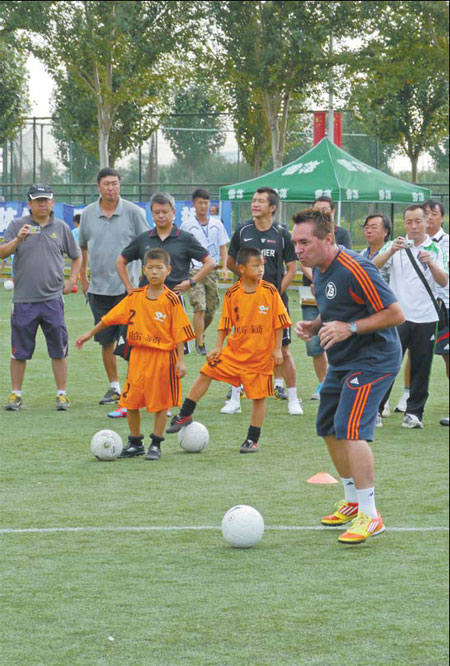World Cup goal is kids' play
|
Tom Byer has hosted football camps across China. Provided to China Daily |
Grassroots approach and foreign expertise can turn China into a football power, but it will take time, says adviser
It was the same old story for China's national football team in February, losing the opening game of its 2015 Asian Cup qualifying group to Saudi Arabia. Off the back of a disastrous, failed attempt to qualify for next summer's World Cup in Brazil, it doesn't seem like there is much for long-suffering fans to cheer about.
But a decade of failure on the football pitch, during which China's team has regressed from its sole World Cup appearance in 2002 and runner-up spot in the 2004 Asian Cup, has at least forced a reappraisal of how the game is organized in the country.
Now a new nationwide, grassroots approach, partly based on the successful Japanese model which has helped that country emerge as one of the strongest in Asia, offers hope for Chinese football fans.
"The whole idea is having a starting point to implement football in China," says Tom Byer, who has been appointed head technical adviser of the Chinese School Football program.
Byer, an American and former professional footballer, oversaw a similar program in Japan for more than 20 years. During his time in Japan many future professionals passed through his football clinics, including Manchester United player Shinji Kagawa. But China will be a whole new challenge.
"The program is currently implemented in 5,000 schools across 90 cities. We have 2 million children involved and it is mandatory for these children to play football a minimum of an hour per week at school," he says.
"From that 2 million, there are 10 percent who are actually playing organized football several times a week within competitions. It's a 10-year program. We have already implemented it in elementary schools, junior high schools and recently high schools. It will also eventually extend to colleges."
Byer's vision has full government backing. China's leadership is not only keen to improve the national team, but also sees football as a way of tackling increasing health and obesity issues among urban youth.
"One of our biggest challenges is the attitude toward sport in China," Byer says. "Parents feel sport is a distraction from education, whereas in the West we look at sport as part of education."
Only by changing this mentality, Byer says, will China develop the depth of talent required to challenge for football's top honors.
"People have to understand you have to be patient. Youth development in grassroots football is probably one of the most misunderstood parts of the game, even in Europe. It's not a faucet you turn on and off. We are only starting to see the big benefits of what we started in Japan 20 years ago.
"The problem is people think you can throw money into the top end and buy success. If you look at the history of football, there is no country that suddenly starts playing regularly at World Cups that hasn't passed through playing an under-17 World Cup first. The pyramid is upside down."
It seems the Chinese Football Association is finally learning this lesson. As well as getting millions of more youngsters playing regular football, the CSF program will also look to get parents enthusiastic about the sport.
While working in a similar role in Japan, Byer promoted football in non-traditional places, such as advertisements in women's magazines, as a way of connecting with parents and stressing the importance of regular exercise for their children.
In China, a series of apps have been developed to connect with children directly, which include 3D films similar to the type of games children are already familiar with.
"It is important to communicate with kids in new and unconventional ways," Byer says. "We have been using outdated methods for too long. You have to understand how the kids receive the information, how they process the information."
The key is not only in persuading children to give football a try, but then quickly providing them with the technical skills to keep them enthusiastic.
"We are trying to get the solid foundation on the technical side. Once kids have the technical ability and are able to manipulate a football, that's when the inner drive, the ignition switch, gets turned on. That's when kids want to practice on their own.
"If you look at the best players in the world, Messi or Ronaldo for example, these are players that practiced hours and hours on their own."
With Byer's CSF program in place, the hope will be that China's next generation of Messis and Ronaldos are already falling in love with the game.
"There's no program like this anywhere else in the world. It's a massive undertaking and if we get it right, it will really set China in a good position to become quite dominant in football in Asia."
For China Daily

























